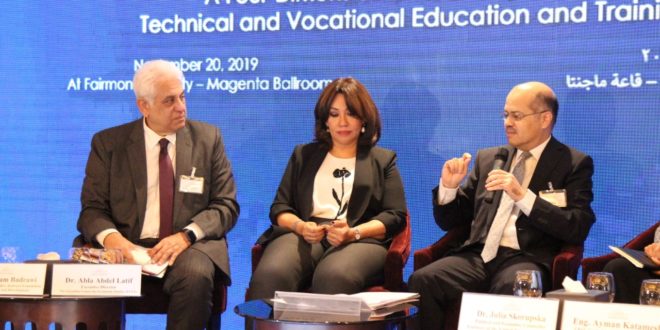At the invitation of the Egyptian Center for Economic Studies, Prof. Dr. Hossam Badrawi delivered a speech today on the development of technical education at the conference held at the Fairmont Hotel entitled “A Four-Dimensional Road Map for Launching the Technical and Vocational Education and Training System”
The symposium comes to explain the results of the survey prepared by the center on technical education and vocational training and the expected demand for labor in manufacturing industries during the next five years, as well as conducting an analysis of the current gap between industry requirements and the outputs of the educational system, evaluating the current status of the system, and studying the best global practices in this regard. .
Dr. Badrawi participated in the opening session, Dr. Abla Abdel Latif, Executive Director of the Center, Dr. Ahmed Fikri Abdel Wahab, Member of the Board of Directors of the Center, Engineer Mohamed El Sewedy, President of the Federation of British Egyptian Industries for Political and Economic Affairs, and Mrs. Julia Schirus, Counselor on behalf of the Embassy, Mrs. Julia Laros The Ambassador of the United Kingdom in Cairo, and Mr. Mohamed Saafan, Minister of Manpower.
The Minister of Education, Dr. Tarek Shofi, also participated in the meeting, by recording a video of his travels to Germany.
Dr. Badrawi explained during his speech Egypt’s vision in technical education 2030, which consists of five axes
The first axis: availability, quality, non-discrimination and justice,
The second axis: the governance of the administration, at the central and decentralized level, down to the school, the heart of the development process.
The third axis is digital education, explaining that in the future the school, teacher and student must be digital. Without digital, we would not be able to keep pace with the development of the world.
The fourth axis: creating conscience and building a normal personality that respects everyone, respects the history of her country, trusts in her present and hopes for her future. Tolerant personality that accepts pluralism and works in the framework of a team. The personality that tastes beauty and instills in its conscience the values of accuracy, commitment and freedom.
The fifth axis: respect for competitiveness in order to be able to compete locally, regionally and globally.
Dr. Badrawi then participated in the second session of the conference, which was entitled: “Future Needs and Realistic Problems of Industrial Establishments with Employment”, which was moderated by Dr. Ahmed Fikri Abdel Wahab, Managing Director of the Egyptian German Automobile Company, and Dr.
The Egyptian Center for Economic Studies also gave a presentation by Dr.: Sahar Aboud at the Egyptian Center for Economic Studies
Co-engineer session, Ahmed Abdel-Hamid, Chairman of the Chamber of Building Materials Industry, Mr. Ihab Zahir Board Member of the Council export ready-to-wear, and Dr. Sherif mountain, Chairman of Chamber of Chemical Industries, Dr. Maged George Chairman of the Board of Directors Mamiba Misr Cosmetics Co., Eng. Nadim Elias, Chairman of the Board of Directors of the Export Council of Printing, Packaging and Paper, and Eng. Hani Berzi, Chairman of the Board of Directors of Edita Food Industries
Dr. Badrawi participated in an intervention during the session, during which he demanded the importance of focusing on a fixed strategy in the development of education that does not change with the change of people, and governments for the goal of sustainability and the accumulation of experiences. Increasing foreign investment to create one million new jobs annually.
He also pointed out the importance of bringing the national framework legislation into light
Dr. Badrawi mentioned that projects for developing technical education, setting a framework for levels of professional competence for each profession, and legislation linking professional merit to a license to practice the profession is vital and essential to controlling the labor market.
He pointed out that this has been started since 2005 and, as usual, it has not been completed, and unfortunately we are starting again now.
 Dr. Hossam Badrawi Official Website
Dr. Hossam Badrawi Official Website


